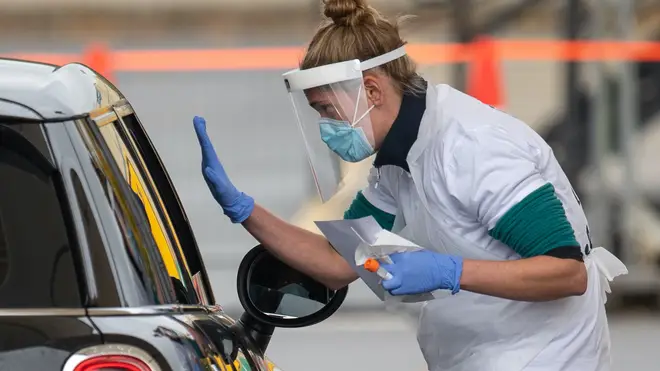
Nick Abbot 10pm - 12am
1 July 2021, 00:01 | Updated: 1 July 2021, 17:21

Experts have said the official list of Covid-19 symptoms should be expanded because the existing one could miss "many" cases.
Like other countries, the UK should include a broader range of symptoms that have been linked to infection, according to a group of scientists that includes an expert advising the Government on the pandemic response.
Classic Covid-19 symptoms are a high temperature, a new continuous cough and/or a loss or change to a person's sense of smell or taste, according to the NHS website.
READ MORE: Covid-19 booster jabs could begin for 32m Brits in September
READ MORE: Education Secretary hopes to lift school bubble restrictions from 19 July
But the most commonly reported symptoms by people taking part in the Office for National Statistics Covid-19 Infection Survey are cough, headache and fatigue.
The latest ONS release shows 61% of people who tested positive reported symptoms.
Of these, 42% had a cough, 39% reported headache and 38% reported fatigue, according to the ONS.
Muscle ache was reported by a quarter of people and 32% reported having a sore throat.
Meanwhile a third reported fever and 21% reported loss of smell and 15% reported loss of taste.
A separate study - the Zoe Covid Symptom study - recently reported that a headache, sore throat and runny nose are now the most commonly reported symptoms.

There are 'at least' 50 symptoms of Long Covid, warns epidemiologist
Writing in the BMJ, Dr Alex Crozier and colleagues - including Professor Calum Semple who is a member of the Government scientific advisory group Sage - suggest that limiting testing to only those with classic symptoms could "miss or delay identification of many Covid cases".
This could "hamper efforts to interrupt transmission" of the virus, they suggest.
The group argue that increasing the symptom list could improve Britain's pandemic response by expanding the criteria for self-isolation and eligibility for symptomatic testing.
They said the "narrow" case definition "limits" the early detection of contagious people, which restricts the efforts of the Test and Trace programme.
Non-traditional symptoms "often manifest earlier", they added.
The US Centres for Disease Control lists 11 more symptoms than the UK, and the World Health Organisation includes nine more.
The testing capabilities in the UK are now able to facilitate people with a broader spectrum of symptoms, they added.
But they conceded that testing people with a single non-specific symptom could overwhelm testing capacity in the UK, but "combinations of symptoms could be used to help identify more cases sooner without overwhelming testing capacity".
And they said some studies have suggested people of different age groups display different symptoms.
The authors wrote: "The UK's decision to adopt a narrow case definition was based on ease of communication, avoiding confusion with other infections and preserving testing capacity. This situation is now different - testing capacity is high."
The current rules state only those with classic symptoms should get a PCR test.
A spokesperson for the Department of Health and Social Care said: "Since the start of the pandemic we have acknowledged Covid-19 has a much longer list of symptoms than the ones initially used in the case definition and our experts keep the list of symptoms under review.
"Anyone experiencing the key symptoms - a high temperature, a new continuous cough, or a loss or change to sense of smell or taste - should get a PCR test as soon as possible and immediately self-isolate along with their household.
"With around one in three people not showing symptoms of Covid-19, we have made regular, rapid testing available twice a week for free for everyone in England."